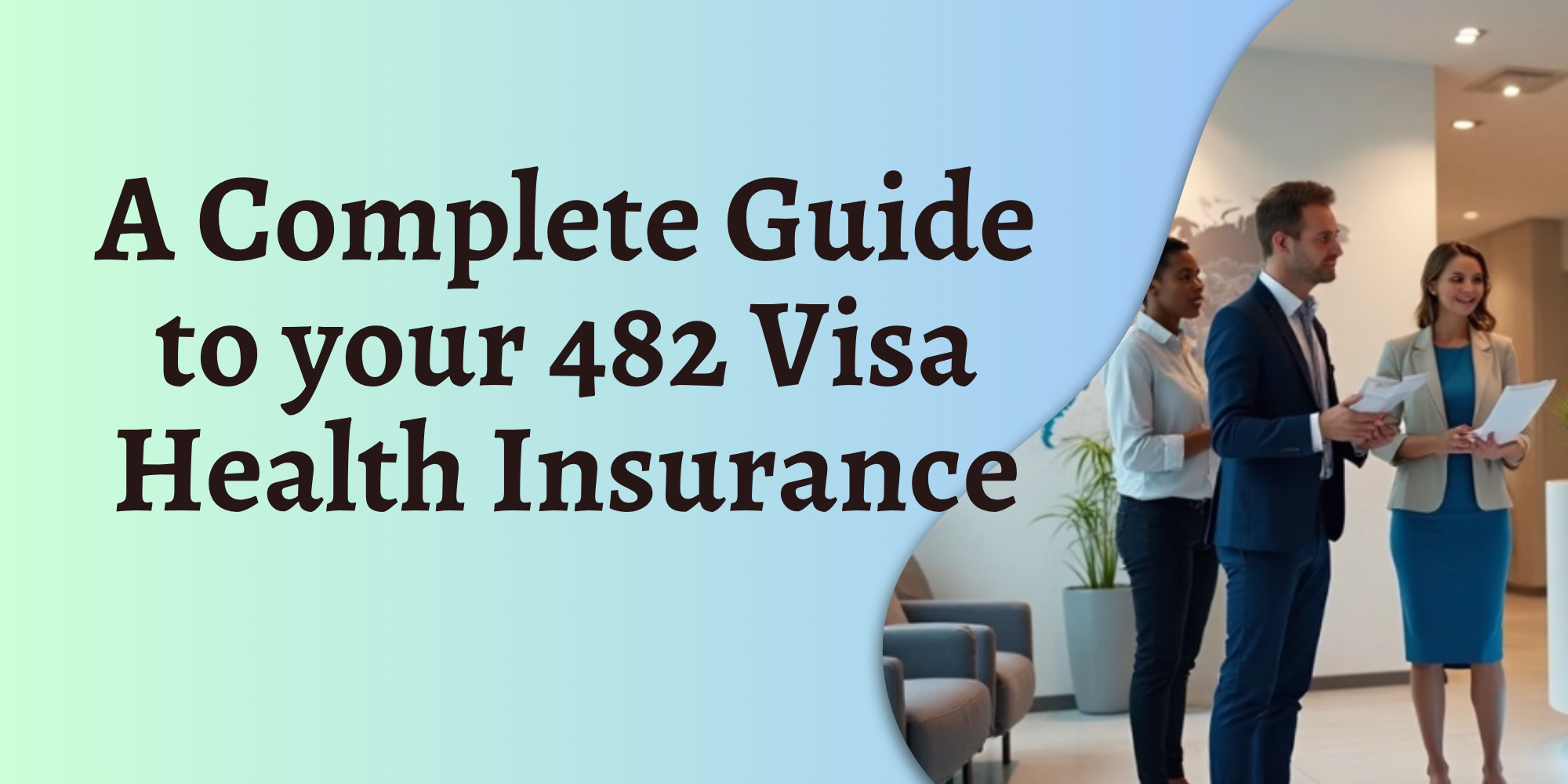Your Australian work visa could be cancelled if you don’t have proper 482 visa health insurance. Getting the right health coverage matters just as much as landing that job offer before moving to Australia.
You’ll need to cover all your healthcare costs during your stay as a 482 visa holder. The rules require health insurance that provides at least AUD 1,000,000 in yearly benefits. Private health insurance becomes a must for your visa application if your country doesn’t have a Reciprocal Health Care Agreement (RHCA) with Australia.
Some people get lucky. Irish passport holders automatically qualify for Medicare under Australia’s reciprocal agreements. Most visitors need detailed private coverage though. The situation gets more complex with Australian health insurance premiums jumping by 3.73% in April 2025—the biggest increase since 2018.
This piece covers everything about 482 visa health insurance requirements. You’ll learn about Medicare eligibility and how to pick the right policy that protects you and meets Australian regulations.
Understanding the 482 Visa Health Insurance Requirement
The Temporary Skill Shortage (TSS) visa requires strict health insurance coverage during your stay in Australia. You must understand these requirements before arrival. Your visa could be cancelled if you don’t maintain proper coverage.
What is visa condition 8501?
Condition 8501 is a legal requirement under Schedule 8 of the Migration Regulations 1994. It requires visa holders to maintain adequate health insurance during their Australian stay. This condition automatically attaches to your 482 visa and stays permanent. Most 482 visa holders can’t access Medicare, which makes them responsible for their medical expenses in Australia.
Who must comply with the insurance requirement?
The insurance requirement applies to:
- Primary 482 visa holders
- All accompanying family members on dependent visas
- Both short-term (1-2 years) and long-term (up to 4 years) visa holders
People from countries with a Reciprocal Health Care Agreement (RHCA) still need insurance coverage between arrival and Medicare enrollment. Italian and Maltese passport holders can use Medicare for six months only. After that, they must have private insurance.
Duration and continuity of coverage
Your health insurance must meet these requirements:
- Start on your first day in Australia
- Run without gaps through your visa period
- Cover at least AUD 1,000,000 per person each year
You need to show proof of insurance when applying for your 482 visa. This usually means a certificate or letter from your insurance provider. Australian health insurers will email you a visa compliance certificate after you buy a policy.
Immigration authorities work with insurance companies to check coverage compliance. Letting your policy lapse or cancelling it breaks your visa conditions and could affect future visa applications.

Medicare and Reciprocal Health Care Agreements (RHCA)
Passport holders from specific countries can access basic healthcare coverage in Australia through Reciprocal Health Care Agreements (RHCA). It’s worth mentioning that 482 visa holders should know exactly what these agreements cover.
Countries with RHCA and what it covers
Australia has RHCAs with all but one of these 12 countries: the United Kingdom, Sweden, Finland, Norway, the Netherlands, Belgium, Slovenia, Malta, Italy, the Republic of Ireland and New Zealand. Your passport from any of these nations might qualify you to enrol in Medicare when you arrive in Australia.
Medicare under RHCA typically covers:
- Medically necessary treatments in public hospitals
- Emergency care that can’t wait until you return home
- Treatment as a public patient
Limitations of Medicare under RHCA
RHCAs offer some coverage but come with major restrictions. Medicare under these agreements doesn’t cover:
- Elective surgery or non-essential treatments
- Private hospital accommodation or treatment
- Dental, optical and physiotherapy services
- Medical evacuation costs
- General practitioner visits (in most cases)
- Ambulance services
On top of that, Italian and Maltese passport holders qualify for reciprocal Medicare only during their first six months in Australia. Private health insurance becomes mandatory after this period.
Why private insurance may still be needed
Private health insurance remains crucial for 482 visa holders with RHCA eligibility for several reasons.
You can’t enrol in Medicare until you arrive in Australia. This creates a coverage gap between your arrival and enrollment. You must have other health insurance arrangements during this time to meet condition 8501.
The Department of Immigration reviews RHCA eligibility case by case – there’s no automatic approval. The limited benefits of RHCA coverage could leave you with hefty out-of-pocket expenses for uncovered services.
Detailed private health insurance gives you peace of mind and broader protection against Australia’s high medical costs. This ensures you stay compliant with your visa obligations throughout your stay.
What Counts as Adequate Health Insurance for 482 Visa
The Australian Department of Home Affairs has set specific criteria for adequate health insurance that 482 visa holders need. A detailed understanding of these requirements will help you pick a policy and stay compliant with your visa conditions.
Minimum benefit levels required
Your 482 visa health insurance must provide benefits equivalent to:
- 100% coverage for hospital accommodation including theatre, intensive care, and ward drugs
- Full coverage for emergency department fees leading to admission
- 100% of Medicare Benefits Schedule (MBS) fee for admitted medical services
- Complete coverage for PBS-listed drugs administered during hospital stays
- 100% coverage for surgically implanted prostheses
Common exclusions and waiting periods
Most 482 visa health insurance policies have these waiting periods:
- 12 months for pregnancy-related services
- 12 months for pre-existing conditions
- 2 months for psychiatric, rehabilitation, and palliative care
Policies usually don’t cover cosmetic surgeries, treatments arranged before arriving in Australia, and treatments received outside Australia. Basic policies also exclude assisted reproductive treatments, elective cosmetic procedures, and stem cell or organ transplants.
Coverage for dependents and family members
You can choose from these insurance options:
- Single policies covering only the primary visa holder
- Dual family policies covering the primary holder plus either a spouse/partner or children under 18
- Multi-family policies covering the primary holder, spouse/partner, and dependent children
The primary visa holder’s policy must cover all secondary visa holders.
Out-of-hospital and emergency services
Basic policies might not cover out-of-hospital services like dental care, physiotherapy, and specialist consultations. You might want to think over adding extras cover for these services. Most compliant policies will give a 100% coverage for emergency ambulance services.
Global annual benefit limits
Your health insurance must provide a minimum annual benefit of AUD 1.53 million per person to meet visa requirements. This amount will cover potential major medical expenses during your Australian stay. Immigration officers check compliance through information from insurance companies, and inadequate coverage could lead to visa cancellation.
How to Choose the Right OVHC Policy
Your 482 visa health coverage needs careful thought to ensure you get both compliance and good value.
Comparing OVHC vs. travel insurance
Travel insurance won’t meet your 482 visa requirements, even with medical expense coverage. Your travel insurance might protect your luggage or flight cancellations, but you’ll need dedicated OVHC to satisfy visa condition 8501. OVHC specifically caters to temporary residents like 482 visa holders and covers medically-required hospital treatments plus a portion of doctor’s fees.
Australian vs. overseas providers
You can get acceptable coverage from both Australian and overseas health insurance providers. All the same, Australian providers give you:
- Quick visa compliance certificates (usually emailed in minutes)
- Networks of providers throughout Australia
- Round-the-clock emergency help
Overseas providers might feel more familiar but need extra checks to confirm their policies meet Australian standards.
Cost considerations and hidden fees
The premium isn’t everything. You should learn about:
- Excess amounts – Provider policies come with excesses from AUD 382.25 to AUD 1146.74
- Coverage exclusions – Lower-cost policies often leave out crucial treatments
- Out-of-hospital services – Simple policies rarely cover dental, physiotherapy or specialist visits
When and how to purchase OVHC
Your OVHC must be in place before visa approval. Immigration officials need your insurer’s confirmation during the application process. Most insurance companies let you apply online and quickly provide visa certification.
Switching policies and portability rules
Australian insurers limit waiting periods to 12 months for higher benefits if you switch after a year’s membership. Members who switch before completing 12 months must finish their waiting periods with the new fund. Every registered private health insurer in Australia counts your previous coverage toward waiting period requirements.
Conclusion
Your 482 visa status depends on meeting Australia’s health insurance requirements. Inadequate coverage could lead to visa cancellation and leave you vulnerable to unexpected medical expenses.
Australian healthcare costs can be substantial. This explains the minimum requirement of AUD 1,000,000 in annual benefits. Citizens from 11 countries have simple coverage through Reciprocal Health Care Agreements. However, these agreements have major gaps that make private insurance essential whatever your nationality.
Your policy must meet specific criteria while you stay in Australia. These include full hospital accommodation coverage, emergency department fees, and PBS-listed medications. The coverage must also protect all dependents who join you on secondary visas.
Look at both Australian and overseas providers as you choose your policy. Focus on exclusions, waiting periods, and excess amounts rather than just premiums. Note that travel insurance won’t meet visa condition 8501—you need specific Overseas Visitor Health Cover.
Australian providers are a great way to get benefits. They offer immediate compliance certification and have prominent healthcare networks across the country. Get your policy before you submit your visa application. Immigration authorities need proof of your insurance arrangements.
The right health insurance safeguards your 482 visa status. The process might seem daunting at first. Yet understanding these requirements protects your visa status and wellbeing during your Australian stay. Your attention to insurance details now helps avoid future complications.

